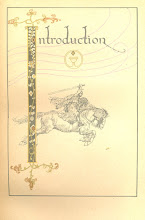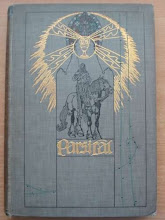The color and theology book I've been reading (see the post below) included a lot of Goethe, whom I love. I had not read Faust in years, though it was a big influence on me at one time, and it was very pleasant to read its poetry again. I looked it up online today to divert myself from the current financial and political maelstrom, and discovered that instead of being a distraction, it instead fits the times perfectly, and puts them into some perspective. One related article I found concerns alchemical themes in the work:
http://www.levity.com/alchemy/faust.html
I just Twittered about the plot point where Mephisto artificially manipulates the economy of a kingdom by convincing its court to indebt themselves to him based on his issuance of paper currency against their territory's gold futures. The empire has been ruined by out-of-control spending, and he offers the courtiers a short-term solution that will cost them their souls in the long run - soul's gold traded for worthless paper. Does this sound familiar? Amazing how the classics can reflect on social situations centuries later - if you write on universal themes, your work will stand the test of time. Mephisto finds men to be so self-destructive that they eagerly embrace his treacheries. Sometimes, he does not even have to get involved - he just watches them ruin themselves: I find, as always, it couldn’t be worse./I’m so impressed with Man’s wretched ways,/I’ve even stopped plaguing them, myself, these days.
The alchemical article also elegantly analyzes the roots of Faust's problems with Mephisto and finds them in patriarchal culture, always one of my favorite targets and very much a part of what's to blame for today's social issues. The dualistic god of patriarchy splits the psyche and sends Faust's vital nature and his anima into his unconscious. He lurches through life listening to his own lowest nature, unable to truly value women because he projects his own inner feminine onto them in a broken fashion. Only in death can he become whole, as he is trapped in the prison of dualistic thought all his life long and requires a transcendent experience to overcome it. The very woman whom he corrupted and whose untimely death he caused comes to his rescue in the afterlife, interceding with the feminine divinity on his behalf: All that shall pass away is but reflection./All insufficiency here finds perfection./All that's mysterious here finds the day./Woman in all of us show us our way.
The author of the article, Adam McLean, neatly comes to the conclusion that all of the characters in Faust together represent the integrated aspects of the Self. Faust requires death to unite them; hopefully, the rest of us can do so in life, while we can still make an impact on this sphere. Early in the work, when Mephisto is talking to God, the devil comments on the way Man uses his reason in a manner divorced from his inner being. This is a classic failing of patriarchy, a worship of rational intellect that fails to take other aspects of consciousness (such as emotion or intuition) into consideration. I will leave you with this last quote to ponder on - ask yourself, how do you apply your faculties of consciousness and reason? Do you use them humbly and compassionately, like Gretchen, the Sophia figure who is willing to aid her former oppressor? - or arrogantly and egotistically, like the financiers who thought they could outsmart and exploit their fellow humans by selling common dirt as diamonds?: Man might appreciate life a little more: he might,/If you hadn’t lent him a gleam of Heavenly light:/He calls it Reason, but only uses it/To be more a beast than any beast as yet.
Here is a free online translation of the Faust text if anyone is inspired to read it: http://www.tonykline.co.uk/PITBR/German/Fausthome.htm
Tuesday, October 7, 2008
Subscribe to:
Post Comments (Atom)









No comments:
Post a Comment